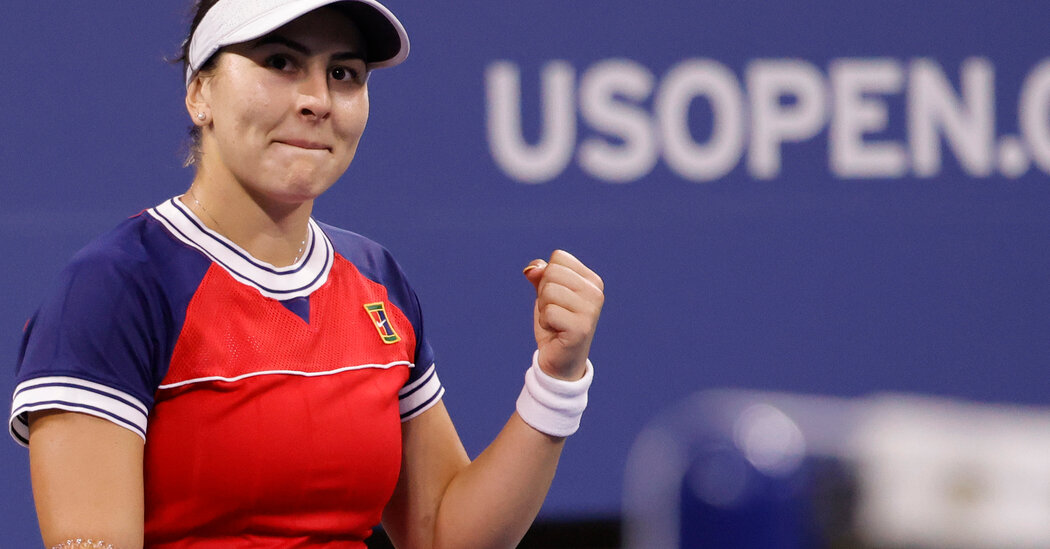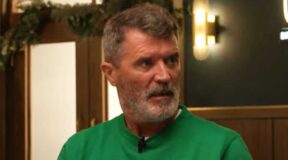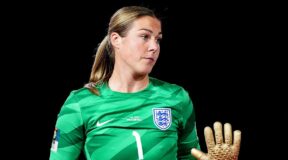So much has changed since her first visit, but Bianca Andreescu is still undefeated at the U.S. Open, where she swept to the 2019 title in precociously grand style, defeating Serena Williams in straight sets in the final at age 19.
After playing no official matches in 2020, she is back in the third round this year, but is also looking back.
“I work on being in the moment, but I do get the flashbacks quite often here,” Andreescu, who practices visualization techniques, told me on Thursday. “I think that’s a good thing because it builds my confidence a little bit, going back and thinking about all that happened in 2019.”
She was in the same physical space as she walked the sprawling grounds where she became Canada’s first Grand Slam singles champion, yet she was in a different place. Her support team is almost entirely new: from her agents, Max Eisenbud and Marijn Bal, to her fitness trainer, Abdul Sillah, to her coach, Sven Groeneveld, who was taking copious notes in the stands of Louis Armstrong Stadium on Thursday night as Andreescu defeated Lauren Davis 6-4, 6-4.
It felt so familiar, and yet so strange. Andreescu walked into the interview room as if she were intent on remaining incognito, mask on, hoodie up, eyes barely visible. It was the same room that was packed in 2019, camera flashes firing in rapid succession as she and her former coach Sylvain Bruneau posed with the U.S. Open trophy. But on this night, with pandemic health restrictions in place, there were just a handful of masked reporters. No flash bulbs. No Champagne. No buzz.
After she finished, we respected the U.S. Open rules, speaking by Zoom for a follow-up interview even though we had just been sitting 12 feet apart in the same room.
“I feel like we’re in some kind of Blade Runner movie,” I said.
“Exactly,” she said. “It’s just super weird, and it’s crazy that it’s still going on, but you can’t really do much about it.”
The pandemic has taken a toll on many professional tennis players, including Andreescu, who tested positive for Covid-19 earlier this year. But her troubles did not begin there.
At the end of her breakthrough 2019 season, in which she also won the BNP Paribas Open in Indian Wells, Calif., and the Rogers Cup in Toronto, I traveled to Toronto to spend a day with Andreescu and watch her become the first tennis player to receive the Lou Marsh Trophy, awarded to Canada’s top athlete in any sport.
But she was limping that day after receiving a platelet rich plasma injection in her ailing left knee, and since then her career has continued to feel like a playground game of one step forward and two steps backward. Injuries, a concern for Andreescu since she was one of the world’s best juniors, have repeatedly knocked her back.
Since her return to the tour in 2021, her fortunes have yet to turn in earnest. She had to quarantine for two weeks ahead of the Australian Open at the start of the season after Bruneau tested positive for the coronavirus after the charter flight to Melbourne. Back in form at the Miami Open, she reached the final against Ashleigh Barty only to retire in tears after injuring her ankle. She then missed much of the clay court season after testing positive for Covid-19 herself in April; split with her longtime management agency; lost in the first round of the French Open; split with Bruneau; and then lost in the first round of Wimbledon, too.
At 21, she concedes that her love of the game and the tour has dimmed on occasion.
“For sure, a couple times this year, when I caught Covid and the part about not being able to see my friends and family for such a long time,” Andreescu said. “My grandma caught Covid. She’s 86. She survived, thankfully, but so many of these things made me question, should I be traveling during this time? But you can’t stop forever, so I tried to deal with everything in the best way I could. Some things I wish I could have done better, but you live and learn, and I’m in a good place physically and mentally right now, and I think that’s all that matters.”
Eisenbud, the senior vice president at IMG, is convinced that the best is yet to come.
“Listen, you don’t beat Serena at 19 years old in the final of the U.S. Open if you’re not really special,” he said.
That is undeniable. Andreescu’s beguiling blend of power, touch and explosive movement makes her a transcendent tennis talent. But while she will be the favorite to win in the third round against Greet Minnen, she is still searching for confidence and consistency. That is unsurprising, considering the many moving parts in her game and her lack of experience and match play. She has still played just one full season on tour, and that season in 2019 was also interrupted by injuries.
Latest Updates
Variety is her trademark — she has all the shots — but she also has a taste for risk and for sharp angles that can lead to flurries of unforced errors. Watching her play and deploy her vast arsenal of weapons can be intoxicating, but there is also the sense that she is winging it, relying on instinct rather than a deep tactical understanding.
“I get bored really easily,” Andreescu once told me. “So even on the court I just try to mix it up. That can be a setback and an advantage, because I have a lot of tools in my toolbox so I try to choose the right ones at the right times as best as I can, but I’m still working on it.”
Her new team was assembled with input from Eisenbud, who began managing Maria Sharapova when she was 12 and helped her become the highest-earning women’s athlete. He later helped the Chinese star Li Na capitalize on her success.
“One commonality around Sharapova’s Grand Slam wins and Li Na’s Grand Slam wins was that everything around the team was calm,” Eisenbud said. “I need to try to get calm water around Bianca.”
Eisenbud and Bal actively recruited Andreescu and have been jointly managing her since June 1. Silla, her new fitness trainer, helped Naomi Osaka improve her conditioning and footwork ahead of her first U.S. Open title in 2018. Groeneveld, who is working with Andreescu on a trial basis, is one of the most experienced coaches in tennis. He coached Sharapova in the later stages of her career and helped her manage chronic injuries, which was an important factor for Andreescu.
She interviewed Groeneveld and several other coaches by FaceTime earlier this year after she made the difficult decision to part ways with Bruneau.
“Sven really stood out right from the start,” she said. “I had what I wanted in a coach written down and what I didn’t want in a coach written down. I made sure to really, really pay attention to this, because I want to get to the next level, and Sven honestly checks all the boxes: Maria Sharapova, injuries, being around on tour a long time, and that experience really, really helps, and I already see it.”
To avoid injuries, Andreescu said they have tailored her schedule to make sure that she does not push too hard on the court during practice if she is pushing hard on her fitness. She also has continued working with Kirstin Bauer, an Austrian physiotherapist and osteopath who is the one holdover on Andreescu’s team from 2019, aside from her parents and her dog Coco.
“I had so many changes happen with my agency, fitness trainer, coach, and having Kirstin by my side through literally everything I’ve been through the last two and a half years is comforting,” Andreescu said. “We work a lot on prevention.”
Staying healthy remains the challenge for Andreescu, and it is nothing new. As a junior, she had back and shoulder injuries as well as stress fractures in her feet that restricted her to non-weight-bearing exercises.
“We had an office chair, and we took the back off it and wheeled it on the court, and every day she would spend an hour and work forehand and backhand,” said André Labelle, one of her early coaches. “I think she had a three-month stretch in the chair.”
But for all her commitment, she has continued to miss too much playing time as a professional, and though it is easy to imagine her dueling for Grand Slam titles for years to come with the likes of Osaka, Barty and Coco Gauff, that vision only makes sense if Andreescu can improve her staying power.
“I’m very impatient,” she said. “I want everything, you know, right away, but I’m getting better with that.”
Source: Read Full Article





